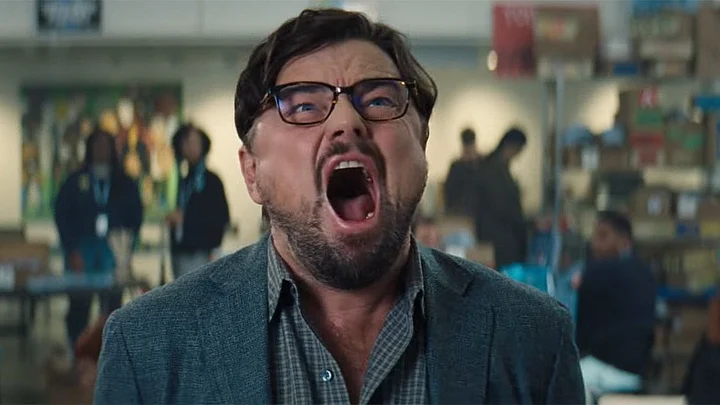The world is ending. What would you expect? Fear? Chaos? Stress? Action? But what does one do when people just refuse to believe that the world is ending? You laugh.
Don't Look Up released on Netflix this Friday in India, starring Meryl Streep, Leonardo Dicaprio, Jenniffer Lawrence and Timothee Chalamet.
But before we discuss the movie, let's get to what you are here for. It is an average one-time watch. The first half-hour has a few laughs, it has some brilliant actors and a good song by Ariana Grande, everything else can be missed.
And before you go to read other reviews, most film critics didn't like it. And honestly, from whatever little I know, it is not great cinema. If, however, you don't want to think much, have some time on your hands this weekend and want to look at amazing actors on the screen, acting in a pretty mediocre direction, I would recommend it.
A Failed Attempt at Social Satire
To me, it is a brilliant case in the gap between scientific research and communication. Not just what the movie shows, but also what it becomes by the end.
The movie works with a very real possibility of doomsday, and the human tendency to dismiss its possibility, but it takes this premise and turns it into absolute flippant noise. If at any point the movie attempted a social satire, it failed.
A Brilliant Cast in a Mediocre Story
Talking of entertainment, the movie fails to captivate the audience. It does have a few sparsely scattered moments of laughter but they are far and few in between spread over 2 hours and 18 minutes.
With a dazzling cast of Meryl Streep- the goddess of cinema, Dicaprio- an Oscar-winning actor, Jenniffer Lawrence- a pop cult favourite and Timothee Chalamet the new Gen-Z love, and a whole bevvy of famous faces here and there, the movie just abysmally fails these actors. Even their talents fall short of making this movie look up.
There are too many things, from national and global geo-politics to individuals and their anxieties that the movie tries to cover but it fails to bring them together.
A Lesson in How to Not Communicate Climate Crisis/Doomsday/Death
Doomsday is not a groundbreaking premise in science fiction cinema. It honestly isn't even a groundbreaking premise in non-fiction scientific reports. I am a journalist who reports on climate change, so honestly, even the premise of people refusing to believe in the possibility of the world actually heating up to a point of real crisis, is not that far off, let alone doomsday.
The story begins with a wide-eyed Kate Dibiasky (Lawrence), a PhD candidate, gaping at a comet. Soon we see scientists realising this huge comet is heading towards earth and will reach in six months and 14 days causing an extinction-level event.
What follows is scientists trying to tell the world that "we are all going to die", but from the media to the president's house, people have no time for it.
The movie is a lesson on what scientists and even the media that try to communicate such events needs to steer clear of-- jargon and alarmist statements, like we see in the movie; And incomprehensible cacophony, that the movie itself becomes. Scientists in the movie struggling and failing to put their point across, is also how much the movie itself failed to do the same.
No Time to Look Up
For the first twenty minutes when scientists 'scientifically' try to describe what a doomsday scenario will look like, it sounds like gibberish. When they simplify it to talk about the real impact-- death, it gets too scary for people to handle.
The struggle of getting people to care about the end of the world and something about it, without sounding alarmist and causing riots, is real. The movie tries to capture this struggle.
The scientists say we must act now, and the politicians say, but first, let's let's talk about poll numbers.
The movie also tries to bring forth how all climate communication is political, it is more than the truth. It reminds us that the scientific reports that we read on the news are also political and they carefully choose what to tell us what to conceal.
But sadly, the movie fails to address anything with nuance, it just ends up contributing to the noise. For a good forty-five minutes in between, I almost zoned out because it just turned into a vague far fetched bunch of randomness. The end, however, was not as disappointing.
